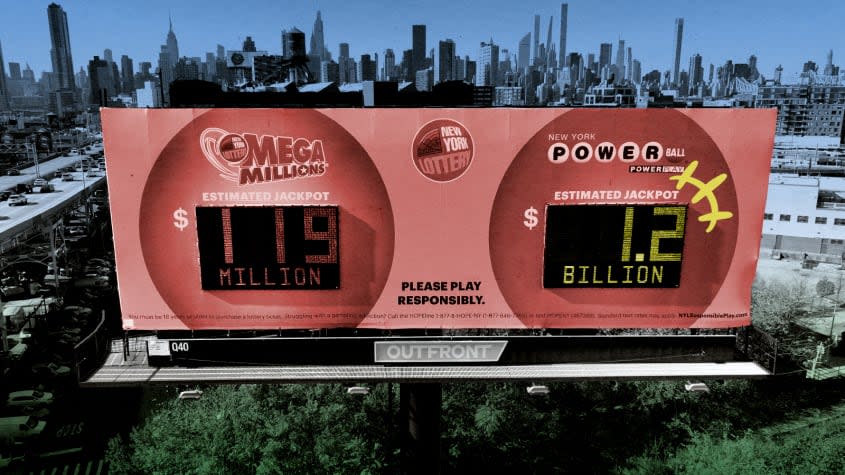What you need to know about the record-breaking Powerball jackpot

The Powerball jackpot has reached $1.9 billion after no winning tickets were sold for the Nov. 5 drawing. If there is a winner in the next drawing on Nov. 7, they will take home the largest payout in U.S. lottery history. Here's everything you need to know:
The latest
The Nov. 7 drawing was delayed due to a "participating lottery needing extra time to complete the required security protocols," the California Lottery tweeted. "Powerball has strict security requirements that must be met by all 48 lotteries before a drawing can occur. When the required security protocols are complete, the drawing will be performed under the supervision of lottery security officials and independent auditors."
How did the Powerball jackpot get so high?
There are a few reasons. Drawings are held three times a week on Mondays, Wednesdays, and Saturdays. No one has won the Powerball jackpot since Aug. 3, so it's been growing since then. Additionally, compared to five years ago, people aren't buying as many tickets for each drawing, "so a smaller percentage of the millions of possible number combinations are covered," Fortune says. "That makes a winner less likely."
What does it take to win the Powerball?
A player has to match all six numbers (five white balls and the red Powerball) on a ticket. The odds of winning are 1 in 292.2 million.
What happens if I win?
If one person matches all of the numbers in the Nov. 7 drawing, they can choose between taking the $1.9 billion paid through an annuity over 29 years, or the lump sum cash option of $929.1 million. It's recommended that the winner immediately contact a lawyer, financial adviser, and accountant.
And don't forget about taxes. "[W]hen anyone wins the lottery, the IRS withholds 24 percent of the winnings off the top," Kiplinger explains. "With this Powerball jackpot, if the winner opted for the lump sum cash value of $929.1 million, they would be subject to federal income tax at the top tax rate, which is 37 percent. The lottery winnings would be reported on the Powerball jackpot winner's 2022 federal income tax return." Oof!
Where is Powerball played?
Tickets can be purchased in 45 states; Washington, D.C.; Puerto Rico; and the U.S. Virgin Islands. Alabama, Alaska, Hawaii, Nevada, and Utah are not part of the lottery. Tickets are $2 each, with the next drawing set for Monday, Nov. 7, at 10:59 p.m. ET.
Is the Powerball predatory?
Critics of state-run lotteries and the Powerball believe that they are predatory and specifically target certain neighborhoods. Researchers from the Howard Center for Investigative Journalism at the University of Maryland found that lottery retailers are "disproportionately clustered in lower-income communities in every state," and "in some states, these patterns also exist in Black and Hispanic neighborhoods." Timothy Fong, co-director of the Gambling Studies Program at the University of California, Los Angeles, told NPR there is "a tremendous amount of advertising and marketing that's pro-lottery," despite the fact that "there are people who do develop unhealthy relationships with the lottery and they develop a gambling use disorder."
It's estimated that half of Americans buy a lottery ticket of some sort at least once a year, Gallup polling has found. People who earn under $10,000 annually are the most likely to play the lottery, the American Institute for Economic Research says, and play most often, at 26 times a year. Researchers found that people who earn less than $12,400 annually spend on average $645 on lotteries in a year.
Victor Matheson, an economics professor at the College of the Holy Cross, told CNBC that Powerball organizers have also been making it harder to win the top prize. In 2015, for example, the lottery added more number combinations, so the odds of winning went from 1 in 175 million to 1 in 292.2 million, and a third drawing day was added in August to increase sales. Also, more ticket sale revenue has been going to the jackpot rather than the smaller prizes that are won when a person matches four or five numbers. The jackpot is won just "frequently enough that we don't lose hope," Matheson said. "Because the lottery is all about selling hope."
Where does the money raised by state-run lotteries go?
Each state lottery has its own policies, with most raising money for education and some also funding road and park maintenance. In California, for example, the funds supplement public education in the state; the lottery says it gave more than $1.8 billion to public schools in the 2020-21 fiscal year, which is 95 cents of every dollar spent on lottery games.
The Howard Center's researchers found that the lotteries often end up "disproportionately benefiting" wealthier school districts as opposed to schools in the lower-income neighborhoods where more tickets are sold, NPR reports. The idea of lotteries helping fund schools is great, but when the reality is "low-income people [are] essentially paying for college scholarships for middle-class and upper-class families to go to college," it's "the American dream, completely in reverse," Les Bernal, national director for the Stop Predatory Gambling advocacy group, told NPR.

